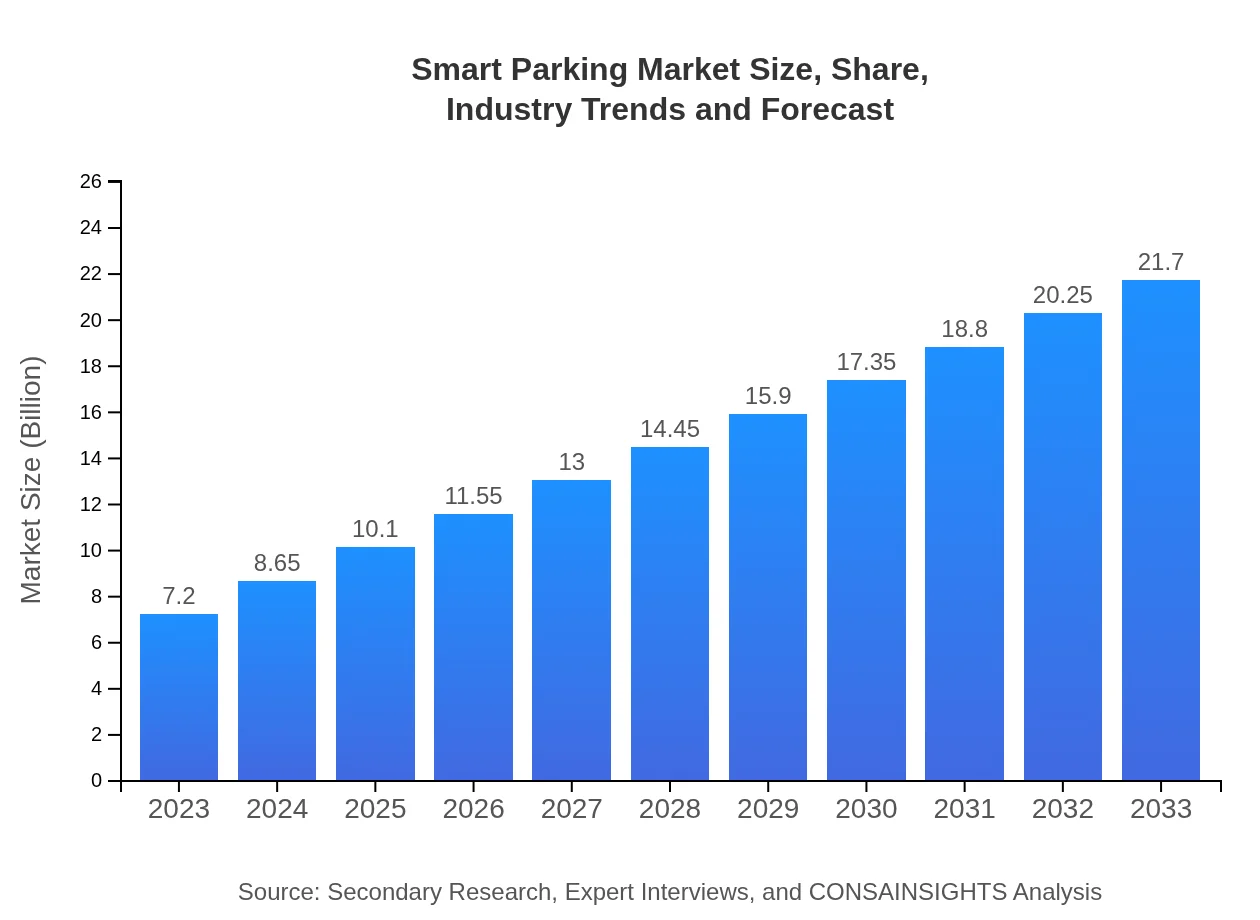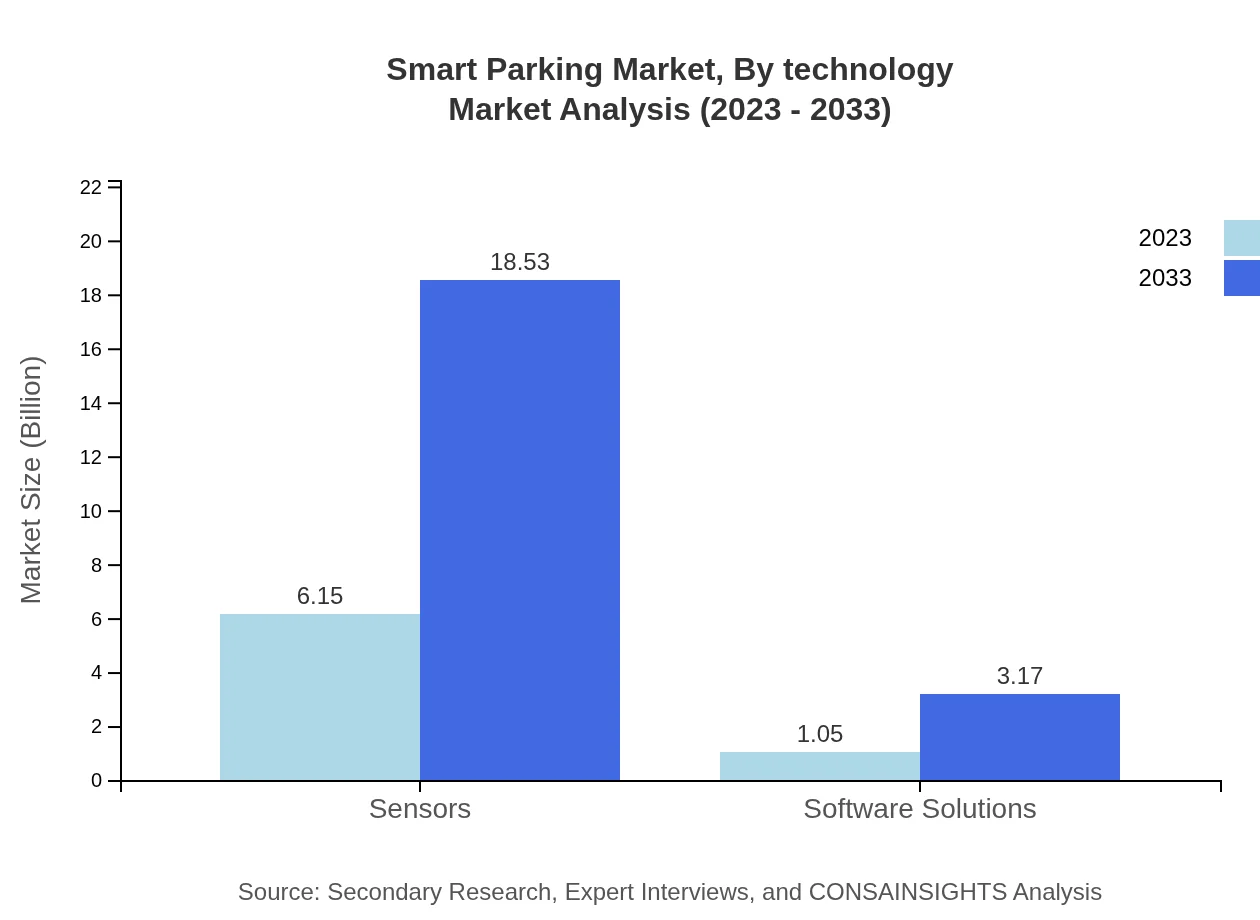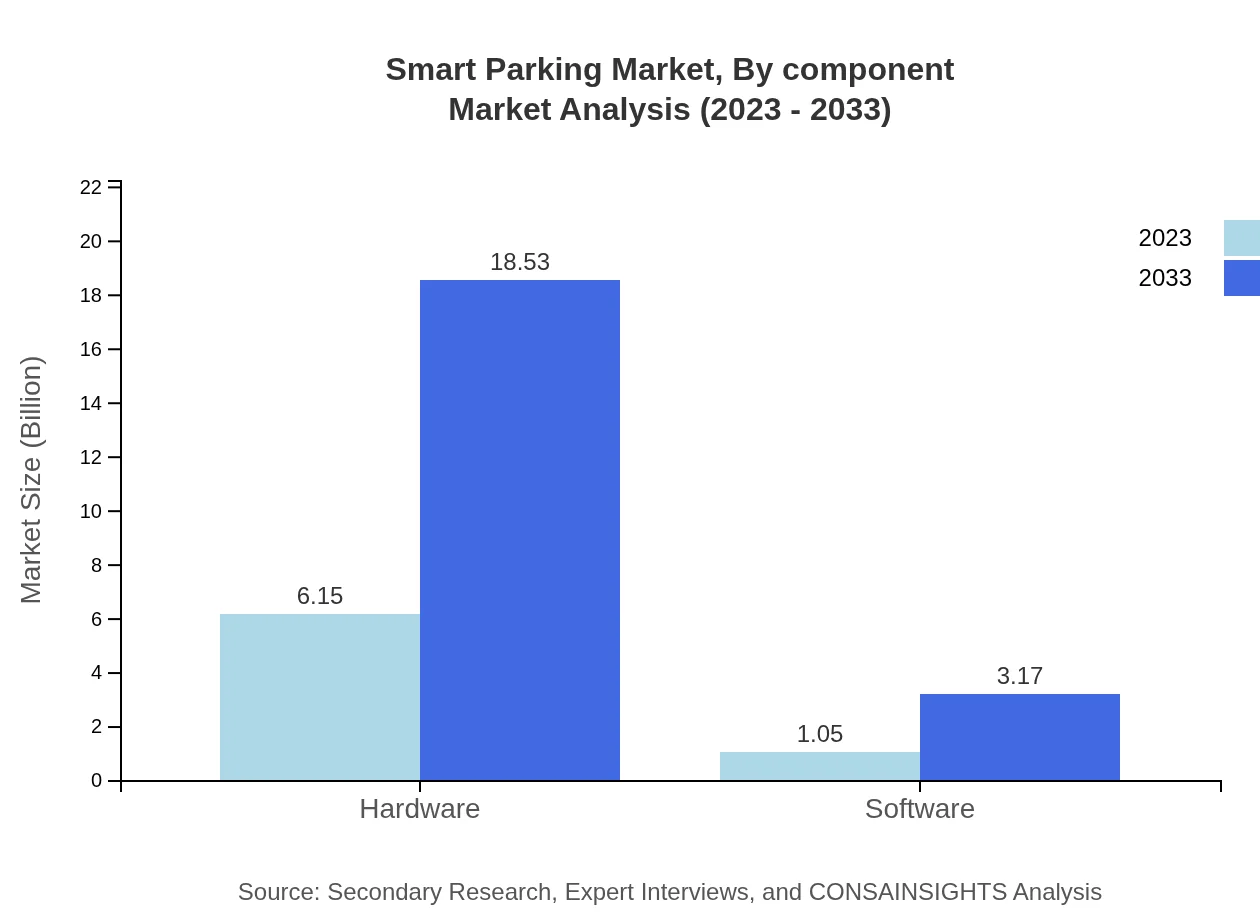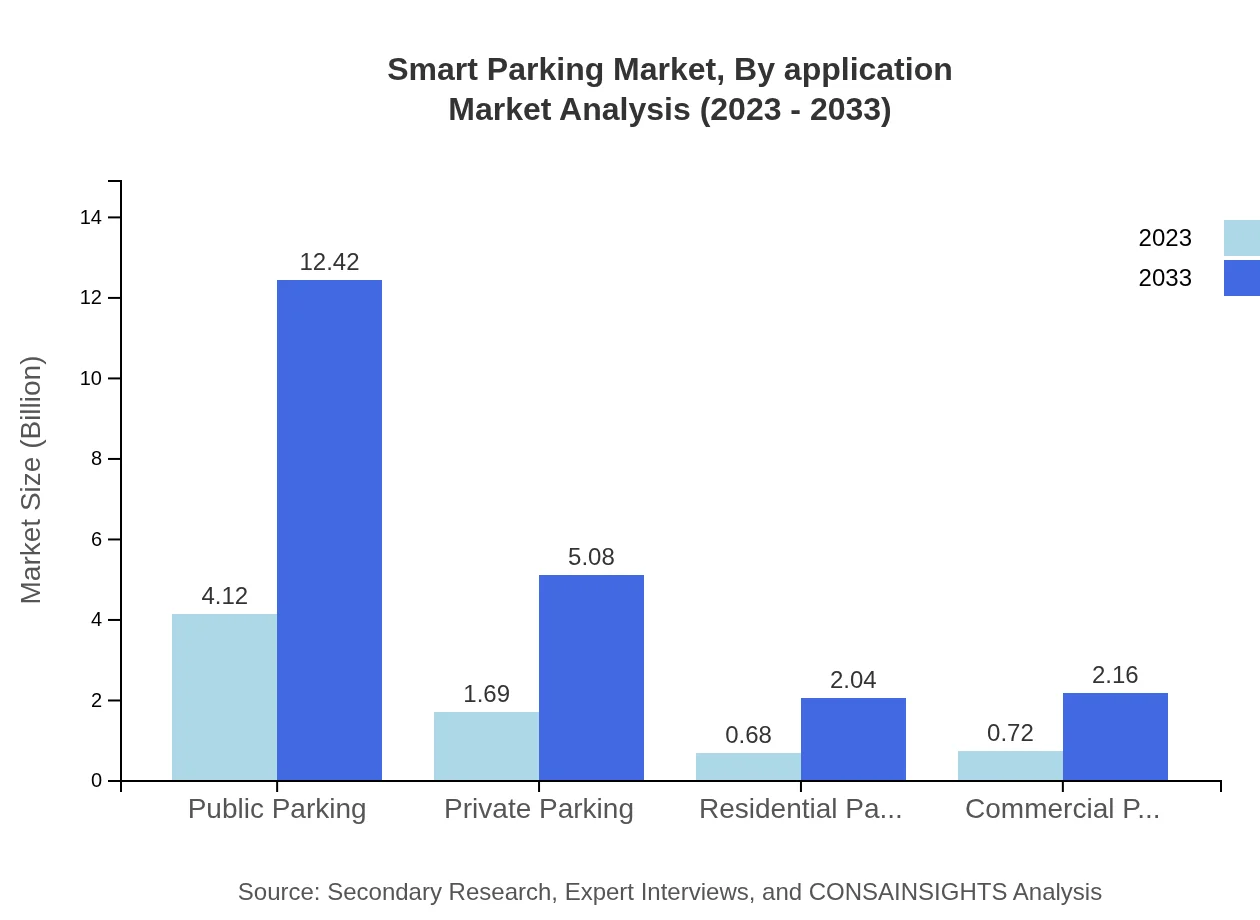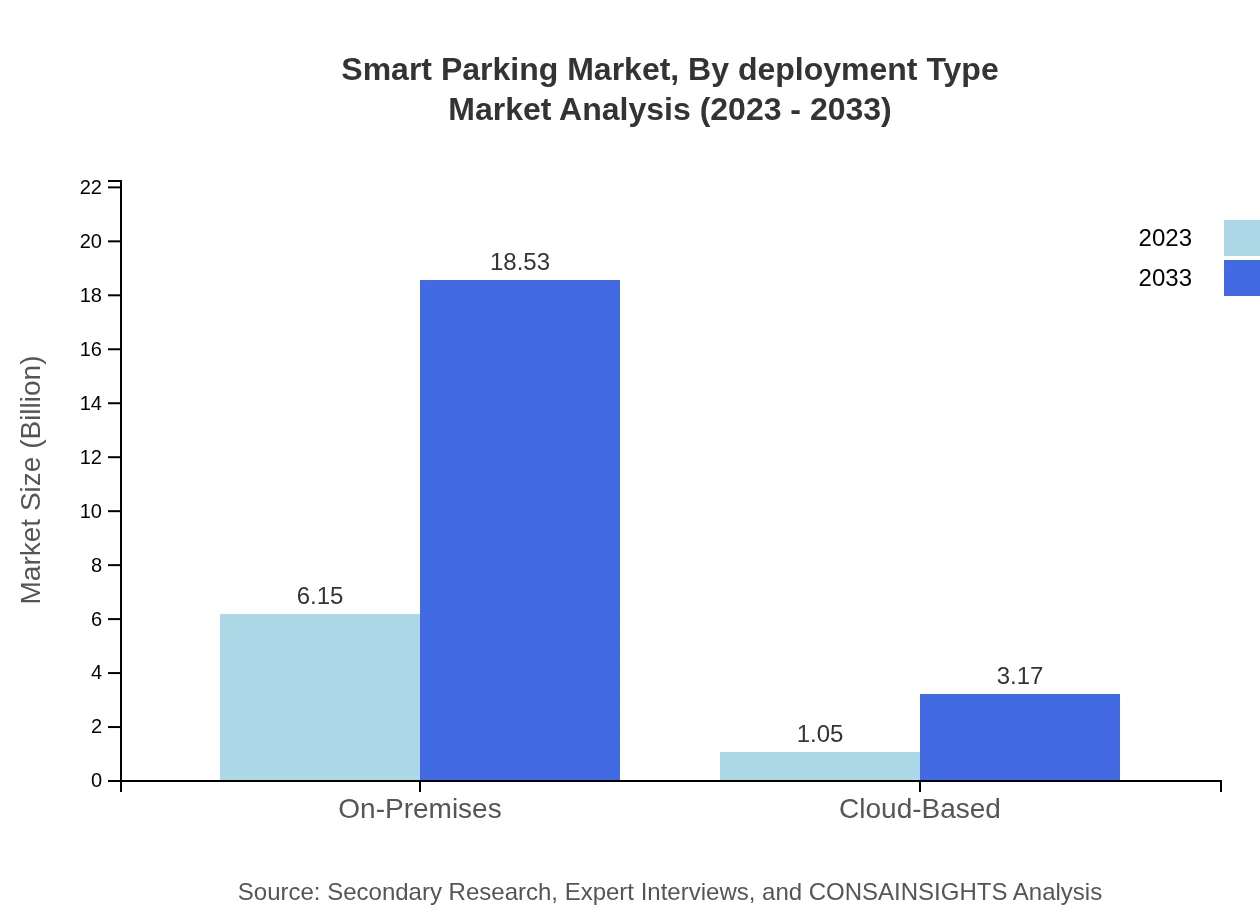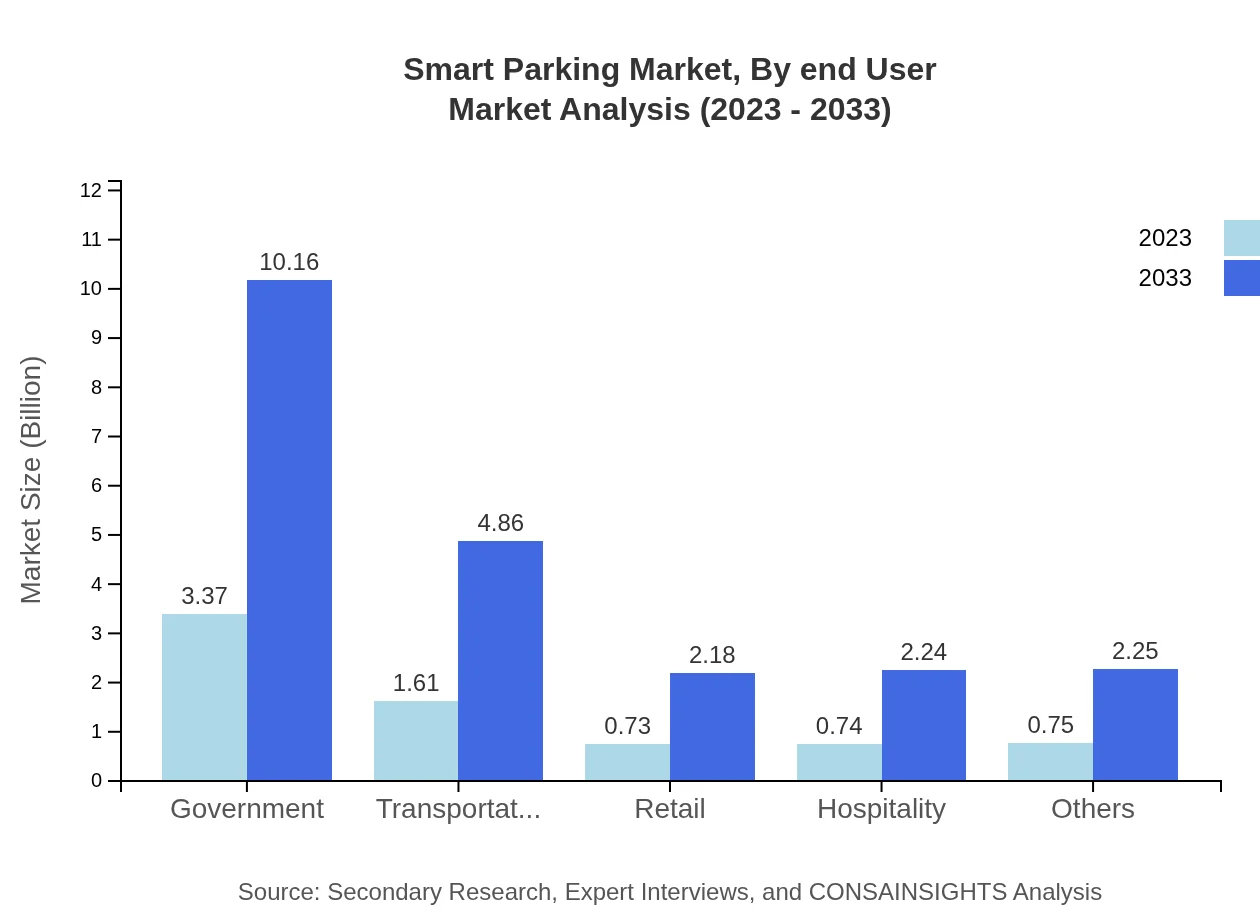Smart Parking Market Report
Published Date: 31 January 2026 | Report Code: smart-parking
Smart Parking Market Size, Share, Industry Trends and Forecast to 2033
This report provides a comprehensive analysis of the Smart Parking market from 2023 to 2033, including market size, growth dynamics, regional insights, technological advancements, and prevailing trends that shape the industry's future.
| Metric | Value |
|---|---|
| Study Period | 2023 - 2033 |
| 2023 Market Size | $7.20 Billion |
| CAGR (2023-2033) | 11.2% |
| 2033 Market Size | $21.70 Billion |
| Top Companies | ParkMobile, FlashParking, Streetline, SWARCO, Ipark |
| Last Modified Date | 31 January 2026 |
Smart Parking Market Overview
Customize Smart Parking Market Report market research report
- ✔ Get in-depth analysis of Smart Parking market size, growth, and forecasts.
- ✔ Understand Smart Parking's regional dynamics and industry-specific trends.
- ✔ Identify potential applications, end-user demand, and growth segments in Smart Parking
What is the Market Size & CAGR of Smart Parking market in 2023?
Smart Parking Industry Analysis
Smart Parking Market Segmentation and Scope
Tell us your focus area and get a customized research report.
Smart Parking Market Analysis Report by Region
Europe Smart Parking Market Report:
Europe's Smart Parking market is estimated to grow from $1.79 billion in 2023 to $5.38 billion by 2033. The European Union's investments in smart city projects and stringent regulations on parking efficiency are influencing the market positively.Asia Pacific Smart Parking Market Report:
In the Asia-Pacific region, the Smart Parking market is projected to witness robust growth, increasing from $1.50 billion in 2023 to $4.52 billion by 2033, owing to rapid urbanization and the growing implementation of smart city initiatives in countries like China and India. The adoption of innovative technologies and an expanding automotive market are further driving demand.North America Smart Parking Market Report:
North America holds a significant market share, valued at $2.76 billion in 2023 and anticipated to reach $8.31 billion by 2033. The presence of advanced technology and growing investment in smart infrastructure, particularly in the U.S. and Canada, propel market growth.South America Smart Parking Market Report:
The South American Smart Parking market, though smaller in comparison, is expected to grow from $0.34 billion in 2023 to $1.04 billion by 2033. The increasing urban population and infrastructure development initiatives by governments will foster the market's expansion.Middle East & Africa Smart Parking Market Report:
The Middle East and Africa region's Smart Parking market is expected to grow from $0.81 billion in 2023 to $2.45 billion by 2033, supported by urbanization trends and the implementation of smart technologies in parking management systems.Tell us your focus area and get a customized research report.
Smart Parking Market Analysis By Technology
The Smart Parking market, segmented by technology, shows a significant inclination towards sensor-based solutions, which are projected to dominate the market due to their efficiency and reliability. Hardware components have a market share of 85.4% in 2023, growing to 85.4% by 2033, indicating a steady demand for innovations in sensor technology.
Smart Parking Market Analysis By Component
In terms of components, the hardware segment remains a critical player, projected to grow from $6.15 billion in 2023 to $18.53 billion in 2033. Software solutions also show promise, growing from $1.05 billion to $3.17 billion, as enhanced software capabilities become essential for smart management systems.
Smart Parking Market Analysis By Application
The applications of Smart Parking solutions are wide-ranging, with government usage leading at a market share of 46.83% in 2023, expected to remain steady. Transportation and retail sectors are also significant contributors, emphasizing the varied demand across different applications.
Smart Parking Market Analysis By Deployment Type
Deployment types in the Smart Parking market can be categorized into on-premises and cloud-based services. On-premises solutions dominate with a share of 85.4% by 2023, while cloud-based solutions are projected to grow due to their flexibility and scalability, increasing from $1.05 billion to $3.17 billion by 2033.
Smart Parking Market Analysis By End User
The end-user landscape of the Smart Parking market encompasses various industries, with public parking representing a substantial market share of 57.24% in 2023. Government and commercial facilities are vital players, highlighting the extensive applicability of smart solutions across different sectors.
Smart Parking Market Trends and Future Forecast
Tell us your focus area and get a customized research report.
Global Market Leaders and Top Companies in Smart Parking Industry
ParkMobile:
ParkMobile offers a leading mobile parking app that allows users to find and pay for parking using their smartphones, enhancing convenience and efficiency.FlashParking:
FlashParking provides an innovative cloud-based parking management system, facilitating customer engagement and operational efficiency for parking industry operators.Streetline:
Streetline specializes in sensor-based parking technologies with solutions that provide real-time availability information to drivers, reducing search times and congestion.SWARCO:
SWARCO offers a comprehensive portfolio of intelligent parking solutions that enhance overall traffic flow and parking efficiency, playing a crucial role in smart city developments.Ipark:
Ipark provides advanced parking technology solutions that incorporate AI and data analytics to streamline parking management and enhance user experience.We're grateful to work with incredible clients.









FAQs
What is the market size of smart Parking?
The global smart parking market is currently valued at approximately $7.2 billion with a compound annual growth rate (CAGR) of 11.2%. Projections indicate this market will expand notably by 2033 as urbanization increases.
What are the key market players or companies in this smart Parking industry?
Key players in the smart parking market include tech giants specializing in IoT, urban solutions, and parking management technology. Companies focus on integrating hardware and software for efficient parking solutions, enhancing user experiences.
What are the primary factors driving the growth in the smart parking industry?
Growth in the smart parking industry is driven by increased urbanization, the demand for better traffic management solutions, and advancements in IoT technology. Sustainability and reducing congestion also play vital roles.
Which region is the fastest Growing in the smart parking industry?
The fastest-growing region in the smart parking industry is North America, projected to expand from $2.76 billion in 2023 to $8.31 billion by 2033. This growth is largely driven by increasing adoption of smart city initiatives.
Does ConsaInsights provide customized market report data for the smart parking industry?
Yes, ConsaInsights offers customized market reports tailored to specific needs in the smart parking industry. These customizable reports can focus on regional trends, market segments, or specific technologies.
What deliverables can I expect from this smart parking market research project?
Deliverables from a smart parking market research project typically include detailed market analysis, trend reports, segmentation data, competitive analysis, and forecasts. Tailored insights can also be provided.
What are the market trends of smart parking?
Market trends in smart parking reveal a shift towards integrated technology solutions, increased sensor adoption, and cloud-based management systems. There is also a growing emphasis on enhancing user convenience and reducing parking search time.

